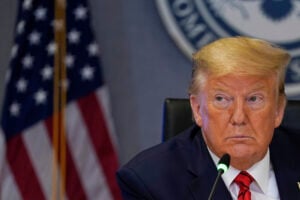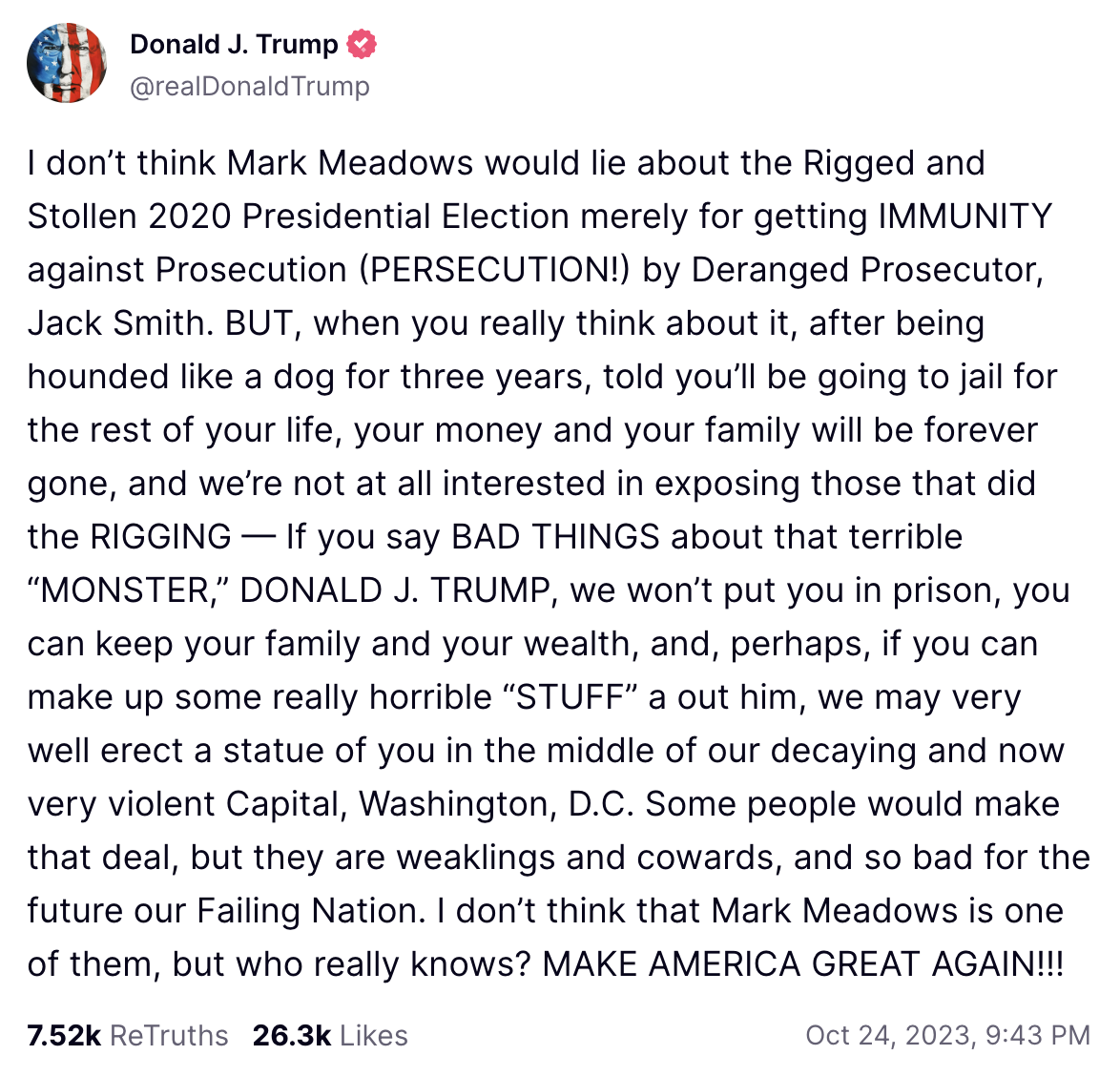[ad_1]

(Photo by Evan Vucci-Pool/Getty Images)
Yesterday Donald Trump managed to get himself sanctioned in New York for violating a gag order. Again.
Most sophisticated clients don’t have to be told once not to attack the judge’s law clerk. Trump has now done it twice, as well as failing to remove the offending post completely from his website. Justice Arthur Engoron fined Trump $10,000 for violating the court’s limited gag order, dismissing Trump’s testimony that he’d been referring to Michael Cohen, yesterday’s witness, when he complained about “a person who is very partisan sitting alongside of [the judge], perhaps even much more partisan than he is.” The court noted that Trump routinely attacks Cohen by name on social media, and that Cohen, even when on the witness stand, was much further away from the guy holding the gavel than the law clerk.
Trump has been on a social media tear, railing against witnesses, judges, and prosecutors in his four pending criminal cases. The prior evening, he slammed Mark Meadows in a blatant attempt to discourage his former chief of staff from testifying in the DC election interference case. The timing could not have been worse for Trump’s lawyers, who are seeking to stay a gag order imposed last week by Judge Tanya Chutkan, which would strongly suggest that the impetus for this outburst is poor impulse control, rather than nine-dimensional chess.

Unsurprisingly, prosecutors noticed Trump’s broadside against Meadows and the courtroom kerfuffle in Manhattan, and flagged them for the DC court.
“In the few days since the administrative stay has been in place, the defendant has returned to the very sort of targeting that the Order prohibits, including attempting to intimidate and influence foreseeable witnesses, and commenting on the substance of their testimony,” they wrote, pointing to the Meadows post and noting that, while the order was in place, Trump lobbed all manner of attacks at the DOJ and Joe Biden, while managing to refrain from attacking witnesses.
In his motions and at the hearing, Trump’s lawyer John Lauro made a series of maximalist arguments against the order. He claimed that gag orders definitionally violate the First Amendment. He insisted that the proper metric is the Brandenberg standard for incitement, not later judicial precedents relating to actual gag orders. He scoffed at the suggestion that rough and tumble political figures like Bill Barr and (Ret.) Gen. Mark Milley might be intimidated, noting that they probably had private security or the US Marshals to protect them anyway. He acceded that he wouldn’t advise a defendant to attack the prosecutor’s wife on social media, but insisted that it would be protected speech to do so. And he assured Judge Chutkan that there was no need for an order, as she could simply explain her expectations, and he would dutifully convey them to his client.
And then Trump set all that on fire yesterday.
After the former president’s behavior this week, it seems highly unlikely that Judge Chutkan will extend the stay of the gag order. But just in case the court needed to be reminded of the stakes, the Special Counsel spelled them out:
There has never been a criminal case in which a court has granted a defendant an unfettered right to try his case in the media, malign the presiding judge as a “fraud” and a “hack,” attack the prosecutor as “deranged” and a “thug,” and, after promising witnesses and others, “IF YOU GO AFTER ME, I’M COMING AFTER YOU,” target specific witnesses with attacks on their character and credibility, even suggesting that one witness’s actions warrant the “punishment” of “DEATH!” The defendant nevertheless claims that the First Amendment, combined with his status as a presidential candidate, grants him an unfettered right to do these things, and more. Indeed, he insists that the Court is powerless even to prevent him from posting photographs of court personnel, or publicly telling known witnesses that they should learn to keep their mouths shut. The most the Court can do, he maintains, is either wait for harassment or violence to occur and then take remedial steps — such as ordering the removal of a particular post or, better yet from the defendant’s perspective, delaying the trial date — or ask defense counsel to “convey” the Court’s “instructions and admonition[s]” to the defendant, with “the expectation” that the defendant will choose to “abide by [the Court’s] instructions in that regard.”
The First Amendment does not require such an ineffectual approach to protecting the integrity and fairness of the trial. To the contrary, the Court has both the authority and the duty to prevent trial participants, including the defendant, from engaging in extrajudicial speech that poses a substantial likelihood of material prejudice.
Trump’s response is due Saturday. Let’s see if he can refrain from publicly tampering with a witness long enough for his lawyers to draft it.
US v. Trump [DDC Docket via Court Listener]
Liz Dye lives in Baltimore where she writes about law and politics and appears on the Opening Arguments podcast.
[ad_2]




